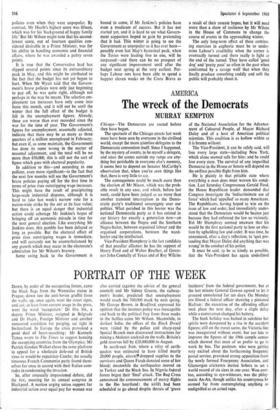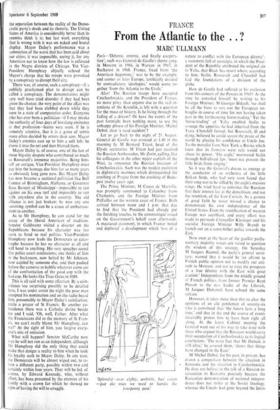The wreck of the Democrats
AMERICA MURRAY KEMPTON
Chicago—The Democrats are routed before they have begun.
The spectacle of the Chicago streets last week must have been seen by everyone in the civilised world, except the more attentive delegates to the Democratic convention itself. Since I happened, by the mystery of events, to be myself a delegate, and since the scenes outside my range are any- thing but perishable in everyone else's memory, it seems best to depend on Senator McCarthy's observation that, when you've seen things like that, there is very little to say.
The consequences could be much more than the election of Mr Nixon, which was the prob- able result in any case, and which, before last week, could have been judged as no more than another transient interruption in the Demo- cratic party's traditional sovereignty over our politics. What perished in this horror was the national Democratic party as it has existed in our history for exactly a generation now—an alliance between the Negro and the Southern Negro-baiter, between organised labour and the organised corporations, between the ward- heeler and the intellectual.
Vice-President Humphrey is the last candidate of that peculiar alliance; he has the support of Henry Ford and of Walter Reuther, of Gover- nor John Connally of Texas and of Roy Wilkins of the National Association for the Advance- ment of Coloured People, of Mayor Richard Daley and of a host of American political scientists. This coalition is as hollow within as it is brazen without.
The Vice-President, it can be safely said, will lose every large state—including New York, which alone seemed safe for him; and he could lose every state. The survival of any imperilled Democrat in the House or Senate will depend on the swiftest possible flight from him.
He is plainly in that pitiable state where everything a man does must worsen his condi- tion. Last Saturday Congressman Gerald Ford, the House Republican leader, demanded that Congress investigate the 'indiscriminate use of force' which had 'appalled' so many Americans. The Republicans, having hoped to win on the issue of law and order, had immediately under- stood that the Democrats would be beaten just because they had enforced the law so viciously. Yet Mr Humphrey seemed unaware that his would be the first national party to lose an elec- tion by upholding law and order. It was time, he announced, after a day's reflection, to 'quit pre- tending that Mayor Daley did anything that was wrong' in the conduct of his police.
It must be said, to be as kindly as possible, that the Vice-President has again underlined
the separation between the reality of the Demo- cratic party's deeds and its rhetoric. The United States of America is considerably better than its enemies think it is; but last week everything that is wrong with it was on naked and brutal display. Mayor Daley's performance was a summation of the worst that has been said about our cities; it was impossible, seeing it, for any American not to know how the law is enforced in the Negro districts of Chicago. Yet Vice- President Humphrey abjectly echoed the Mayor's charge that his troops were provoked by a conspiracy to disrupt their city. There was, of course, such a conspiracy—if a publicly proclaimed plan to disrupt can be called a conspiracy. The demonstrators might very well have tried disorder if they bad been given the chance; the very point of the affair was that they had been clubbed down while they were in a state of comparative order. Everyone who has ever been a politician—if I may invoke the authority of four days of lowslung eminence at that profession—learns very soon, if he is remotely attentive, that it is a game of tennis more often decided by errors than aces. Mayor Daley's enemies cast up to him a soft lob; he drove it into the net and then blamed them.
Mayor Daley is, of course, one of the last of those big-city despots who contributed so much to Roosevelt's immense majorities. Being him- self an antique, Vice-President Humphrey must pay him the homage due him for so many years so obviously long gone now. But Mayor Daley has now become a sectional politician like Bull Connor of. Birmingham, Alabama, or Governor Ross Barnett of Mississippi—impossible to run against on his own turf and impossible to run with anywhere else in the country. The old alliance is not just broken; by now any one surviving symbol can be a cause of embarrass- ment to another.
As to Mr Humphrey, he can stand for the decay of the liberal American of tradition. Senator Goldwater visited a disaster on the Republicans because his character was too stern to bend to real politics. Vice-President Humphrey now leads the Democrats to catas- trophe because he has no character at all and will bend to anything. His very speeches sound like police court confessions; one thinks of him in the backroom, now belted by Mr Johnson, now cajoled by someone else, and then pushed before the cameras to babble whatever came out of the confrontation of the good cop with the bad cop. He looks like Titus Oates in 1689.
This is all said with some affection. By a coin- cidence too surprising possibly to be detailed here, I was under arrest the night the poor man accepted his nomination and on the radio heard him, presumably to Mayor Daley's satisfaction, recite a prayer of St Francis. By another co- incidence there was a Catholic divine beside me and I said, 'Oh, well, Father. After what the Franciscans did to the memory of St Fran- cis, we can't really blame Mr Humphrey, can we?' At the sight of him, you forgive every- one's sins of omission.
What will happen? Senator McCarthy now says he will not run as an independent, although Mr Humphrey did the only thing that could make that danger a reality to him when he took his loyalty oath to Mayor Daley. In any case, the Democrats will be almost wiped out, to re- turn a different party, possibly within two and certainly within four years. They will be led, of course, by Edward Kennedy, who, without effort, has been presented by the enemies of his family with a crown for which he showed no signs of having the will to struggle.







































 Previous page
Previous page